Podcast: Play in new window | Download (Duration: 8:49 — 6.2MB) | Embed
Subscribe: Apple Podcasts | Spotify | Amazon Music | Android | Pandora | iHeartRadio | JioSaavn | Podchaser | Gaana | Podcast Index | Email | TuneIn | Deezer | Anghami | RSS | More
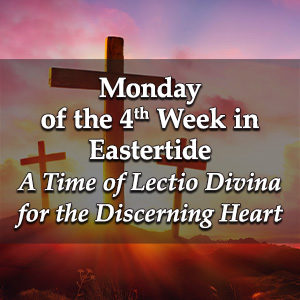 Monday of the Fourth Week of Eastertide – A Time of Lectio Divina for the Discerning Heart Podcast
Monday of the Fourth Week of Eastertide – A Time of Lectio Divina for the Discerning Heart Podcast
As you begin, take a deep breath and exhale slowly. For at least the next few moments, surrender all the cares and concerns of this day to the Lord.
Say slowly from your heart “Jesus, I Trust In You…You Take Over”
Become aware that He is with you, looking upon you with love, wanting to be heard deep within in your heart…
From the Holy Gospel According to St. John 10:11-18
Jesus said:
‘I am the good shepherd:
the good shepherd is one who lays down his life for his sheep.
The hired man, since he is not the shepherd
and the sheep do not belong to him,
abandons the sheep and runs away
as soon as he sees a wolf coming,
and then the wolf attacks and scatters the sheep;
this is because he is only a hired man
and has no concern for the sheep.
‘I am the good shepherd;
I know my own
and my own know me,
just as the Father knows me
and I know the Father;
and I lay down my life for my sheep.
And there are other sheep I have
that are not of this fold,
and these I have to lead as well.
They too will listen to my voice,
and there will be only one flock,
and one shepherd.
‘The Father loves me,
because I lay down my life
in order to take it up again.
No one takes it from me;
I lay it down of my own free will,
and as it is in my power to lay it down,
so it is in my power to take it up again;
and this is the command I have been given by my Father.’
What word made this passage come alive for you?
What did you sense the Lord saying to you?
Once more give the Lord an opportunity to speak to you:
Jesus said:
‘I am the good shepherd:
the good shepherd is one who lays down his life for his sheep.
The hired man, since he is not the shepherd
and the sheep do not belong to him,
abandons the sheep and runs away
as soon as he sees a wolf coming,
and then the wolf attacks and scatters the sheep;
this is because he is only a hired man
and has no concern for the sheep.
‘I am the good shepherd;
I know my own
and my own know me,
just as the Father knows me
and I know the Father;
and I lay down my life for my sheep.
And there are other sheep I have
that are not of this fold,
and these I have to lead as well.
They too will listen to my voice,
and there will be only one flock,
and one shepherd.
‘The Father loves me,
because I lay down my life
in order to take it up again.
No one takes it from me;
I lay it down of my own free will,
and as it is in my power to lay it down,
so it is in my power to take it up again;
and this is the command I have been given by my Father.’
What did your heart feel as you listened?
What did you sense the Lord saying to you?
Once more, through Him, with Him and in Him listen to the Word:
Jesus said:
‘I am the good shepherd:
the good shepherd is one who lays down his life for his sheep.
The hired man, since he is not the shepherd
and the sheep do not belong to him,
abandons the sheep and runs away
as soon as he sees a wolf coming,
and then the wolf attacks and scatters the sheep;
this is because he is only a hired man
and has no concern for the sheep.
‘I am the good shepherd;
I know my own
and my own know me,
just as the Father knows me
and I know the Father;
and I lay down my life for my sheep.
And there are other sheep I have
that are not of this fold,
and these I have to lead as well.
They too will listen to my voice,
and there will be only one flock,
and one shepherd.
‘The Father loves me,
because I lay down my life
in order to take it up again.
No one takes it from me;
I lay it down of my own free will,
and as it is in my power to lay it down,
so it is in my power to take it up again;
and this is the command I have been given by my Father.’
What touched your heart in this time of prayer?
What did your heart feel as you prayed?
What do you hope to carry with you from this time with the Lord?
Our Father, who art in heaven,
hallowed be thy name.
Thy kingdom come.
Thy will be done on earth, as it is in heaven.
Give us this day our daily bread,
and forgive us our trespasses,
as we forgive those who trespass against us,
and lead us not into temptation,
but deliver us from evil.
Amen

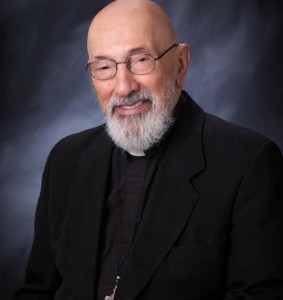 Msgr. Esseff reflects on the readings from the 4th Sunday of Easter, and in particular, Our Lord’s teachings on the role of the Good Shepherd. At the end of this episode, Msgr. Esseff offers
Msgr. Esseff reflects on the readings from the 4th Sunday of Easter, and in particular, Our Lord’s teachings on the role of the Good Shepherd. At the end of this episode, Msgr. Esseff offers 
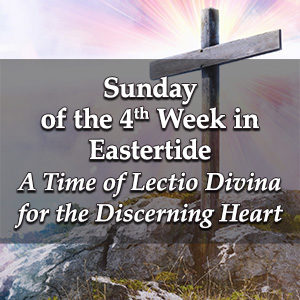 Sunday of the Fourth Week of Eastertide – A Time of Lectio Divina for the Discerning Heart Podcast
Sunday of the Fourth Week of Eastertide – A Time of Lectio Divina for the Discerning Heart Podcast
 Christ is the bridge to the Father and we cross this bridge by allowing our hearts to be pierced by what the Lord has done for us. The passion of Christ reveals at once the truth about who God is and who we are in his sight. For her, among the greatest blocks to the spiritual life is ignorance. Knowledge of God and knowledge of self go hand in hand in progressing toward spiritual maturity. But the knowing is not simply an intellectual trip. It as the kind of knowing informed by the loving affection of a real friendship. The friendship she describes in tender terms evokes the deepest joys and sorrows all at once.
Christ is the bridge to the Father and we cross this bridge by allowing our hearts to be pierced by what the Lord has done for us. The passion of Christ reveals at once the truth about who God is and who we are in his sight. For her, among the greatest blocks to the spiritual life is ignorance. Knowledge of God and knowledge of self go hand in hand in progressing toward spiritual maturity. But the knowing is not simply an intellectual trip. It as the kind of knowing informed by the loving affection of a real friendship. The friendship she describes in tender terms evokes the deepest joys and sorrows all at once.
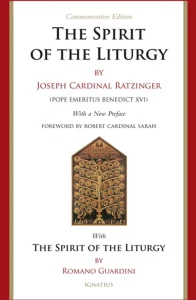



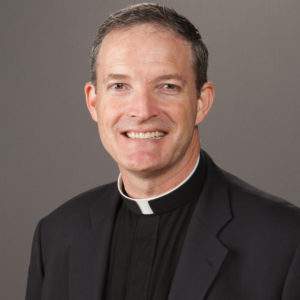


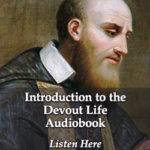
 For other audio recordings of various spiritual classics you can visit the
For other audio recordings of various spiritual classics you can visit the 